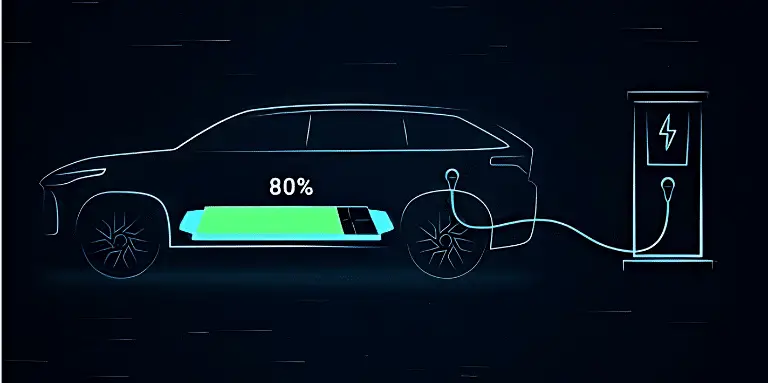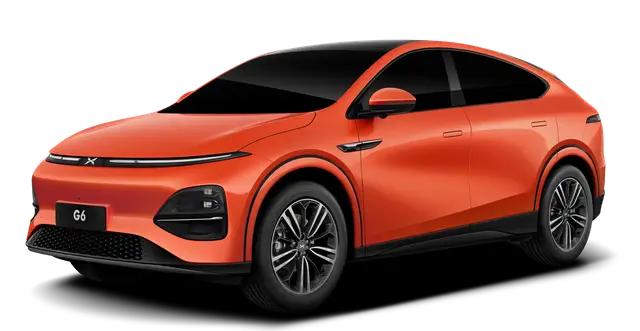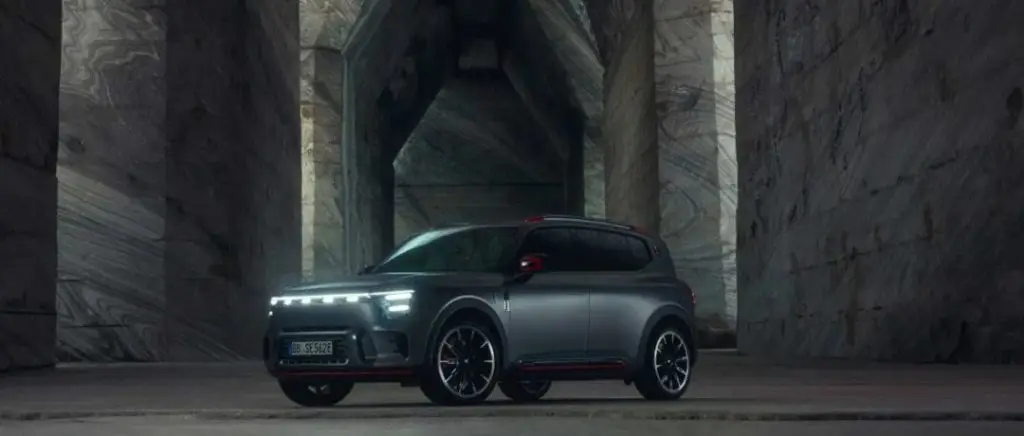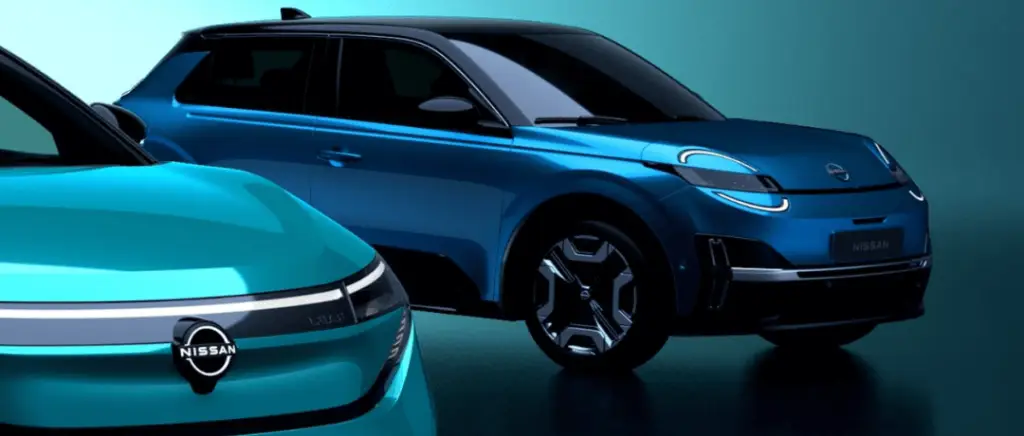All you need to know about recharging electric cars: power and recharging time of charging stations
Understanding the difference between AC and DC charging stations
As the world turns to electromobility, the question of charging becomes essential. Among the many technical terms, two stand out: AC and DC charging stations.
But what do they mean and what are their differences?
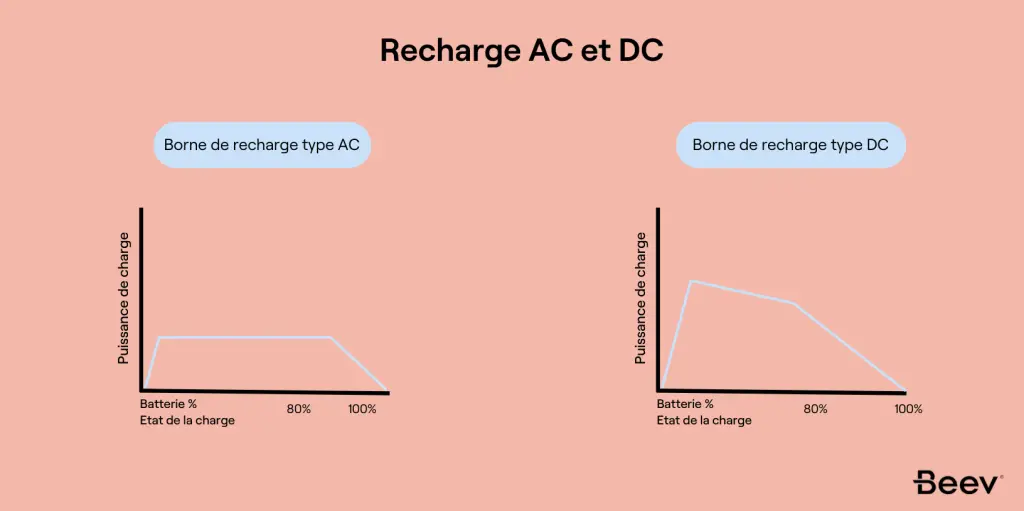
AC: Slow but regular recharging
AC charging stations deliver alternating current, similar to that of our wall sockets. This type of charging is slower than DC charging, with power levels generally between 3.7 kW and 22 kW.
Benefits :
- Widespread : AC kiosks are ubiquitous, whether in parking lots, service stations or even at home.
- Cost-effective solution: they are generally less expensive to install and operate than DC terminals.
- Suitable for daily charging: perfect for slow recharging at night or while parked.
Disadvantages :
- Longer recharging time : Fully recharging a battery can take several hours.
- Limited power : not suitable for fast charging.
DC: Fast charging, for those in a hurry
DC charging stations, on the other hand, supply a direct current, directly compatible with the electric vehicle's battery. This technology enables ultra-fast chargingwith power ratings of up to several hundred kilowatts.
Advantages:
- Lightning recharge : recovers a large part of thebattery's range in a minimum amount of time, ideal for long journeys.
- Perfect for occasional trips: handy for quick recharging at freeway stops.
Disadvantages :
- Less common: DC terminals are even less common than AC terminals.
- Higher cost: DC terminals are generally more expensive to install and operate.
- Less suitable for everyday use: thanks to their high power, they are not ideal for slow recharging at night.
To sum up, what type of terminal should you choose?
The choice between an AC or DC charging station depends on your needs and driving habits:
- if you're looking for an economical economical and practical daily charging choose an AC charging station.
- if you need to recharge your vehicle quickly on long journeys DC charging stations are your ally.
Find out more : Which electric charging point to choose?
Factors affecting the charging time of an electric car
Several factors influence the charging time of an electric car. First of all, battery capacity and remaining charge level have a direct impact on the time needed for a full recharge. A higher-capacity battery will logically take longer to fully charge.
The power of the charger used is also important. Slow domestic chargers (3-7 kW) can take several hours to fully charge, while fast-charging stations (50-350 kW) can recover 80% range in around 20-40 minutes. Outside temperature also affects battery efficiency, slowing charging slightly in cold weather.
Finally, the condition of the battery and its ageing after several years of use can degrade its maximum charge capacity. Intelligent charge management, by modulating power according to need, optimizes recharge times.
Read more: Summer's impact on electric batteries: what professionals need to know
Discover the different types of plugs and connectors for electric cars
Home sockets or public terminals: what's the right choice?
Here is a summary of the main points to consider when choosing between a domestic socket or a public charging point to recharge your electric car:
Home refill
The vast majority (around 80%) of electric vehicle owners opt for home charging, which is more practical and economical in the long term.
- Reinforced socket (3 - 7 kW): least expensive solution (€60 - 130), but slower (full recharge in 8h - 12h). Suitable for short daily trips.
- Wallbox / Home terminal (7 - 22 kW): faster (80% recharge in 2h - 4h) but the most expensive (€500 - €1500 + electrical installation). Allows intelligent control and billing per kWh consumed.
To reduce your electricity bill, we recommend that you schedule your charging during off-peak hours.
If you are interested ininstalling a home charging stationplease contact us.
Public terminals
A minority use public charging stations, a solution more suited to occasional use or as a complement to the home.
- Slow kiosks (3-22 kW): free or chargeable (0.36-0.72€/kWh), sometimes with an annual subscription (120€ private, 600€ pro).
- Fast charging stations (50-350 kW): for fast one-off recharges (80% in 20-40 min) on major roads.
Access often requires a subscription card, and rates vary from operator to operator (billing by kWh, load, minute or session).
So, for everyday use, home recharging with a reinforced socket or home terminal remains the most practical and economical solution, while public terminals are better suited to occasional top-up.
Public charging of electric cars: how does it work?
Find and use public terminals
In France, finding a charging station is easy, thanks to more than 100,000 publicly accessible charging points. Users can easily locate the nearest charging point to their current location using specialized mobile applications or dedicated websites.
These digital tools offer detailed information such as terminal location, socket type, available power and, sometimes, real-time occupancy status. Access to these kiosks is usually simply a matter of registering on a specific network, or using an RFID card supplied by the service provider.
Find out more : All charging networks for electric cars, a comparison
Which electric recharging network is right for you in France?
| Network | Number of terminals | Terminal types | Coverage | Rates |
|---|---|---|---|---|
| Tesla | 4644 | Superchargers (up to 250 kW) | Mainly along freeways | 0.36 €/kWh |
| Ionity | 1700 | Fast charging stations (up to 350 kW) | Freeways and trunk roads | 0.79 €/kWh |
| TotalEnergies | 1073 | Fast and normal charging stations | National coverage | 0.52 €/kWh (up to 50 kW) |
| Fastned | 300 | Fast charging stations (up to 350 kW) | Mainly along freeways | 0.59 €/kWh |
| Izivia | 8000 | Normal and accelerated charging stations | National coverage | 0.40 €/kWh (up to 22 kW) |
| Allego | 15 000+ | Fast and normal charging stations | Europe, including 3,000 in France | From €0.30/kWh |
| Alizé | 3 000+ | Normal and accelerated charging stations | France | From €0.25/kWh |
| Driveco | 2 000+ | Fast and normal charging stations | France | From €0.30/kWh |
| EVzen | 1 500+ | Fast and normal charging stations | France | From €0.40/kWh |
| Freshmile | 1 000+ | Fast and normal charging stations | France | From €0.35/kWh |
| KiWhi Pass | 1 000+ | Fast and normal charging stations | France | From €0.29/kWh |
Credit card payment mandatory for charging stations: the electric charging revolution is underway
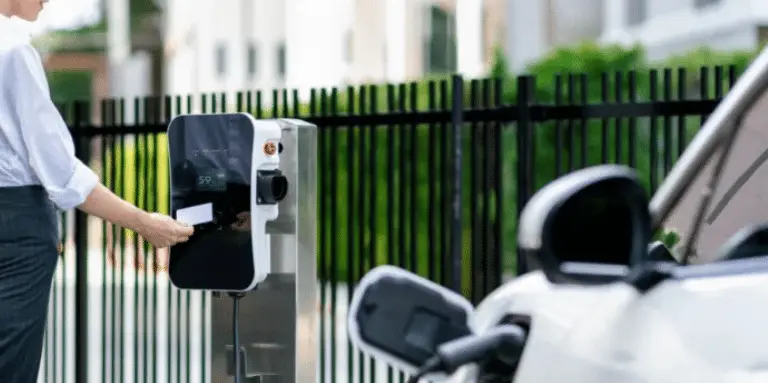
April 13, 2024 represents a key date for electric car charging in Europe. New regulations and initiatives are being put in place to encourage the adoption of electric vehicles and improvecharging infrastructure.
From now on, all new fast-charging stations, with a minimum capacity of 50 kW, will have to transparently display the cost of charging in euros per kilowatt-hour (€/kWh), adopting a model similar to conventional fuel pricing per liter.
In addition to this requirement for tariff transparency, electric vehicle users will need to have real-time access to information on prices and the availability of charging points via digital channels.
This enhanced transparency will enable electric vehicle owners to better manage their costs and plan their recharges more efficiently. What's more, these new charging stations will have to accept credit card payments at no extra charge, as opposed to the current use of dedicated charging cards or apps specifically for electric vehicles.
NB: These regulations only apply to new fast-charging stations. Existing installations have until 2027 to comply with these standards.
Charging your electric car at home: how does the installation work?
Installing a Wallbox at home: how and for how much?
Here you'll find the main information on installing a Wallbox (electric vehicle charging station) at home and its cost.
How do I install a Wallbox at home?
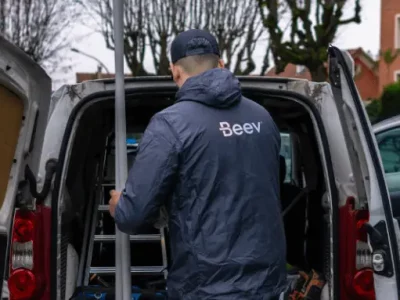

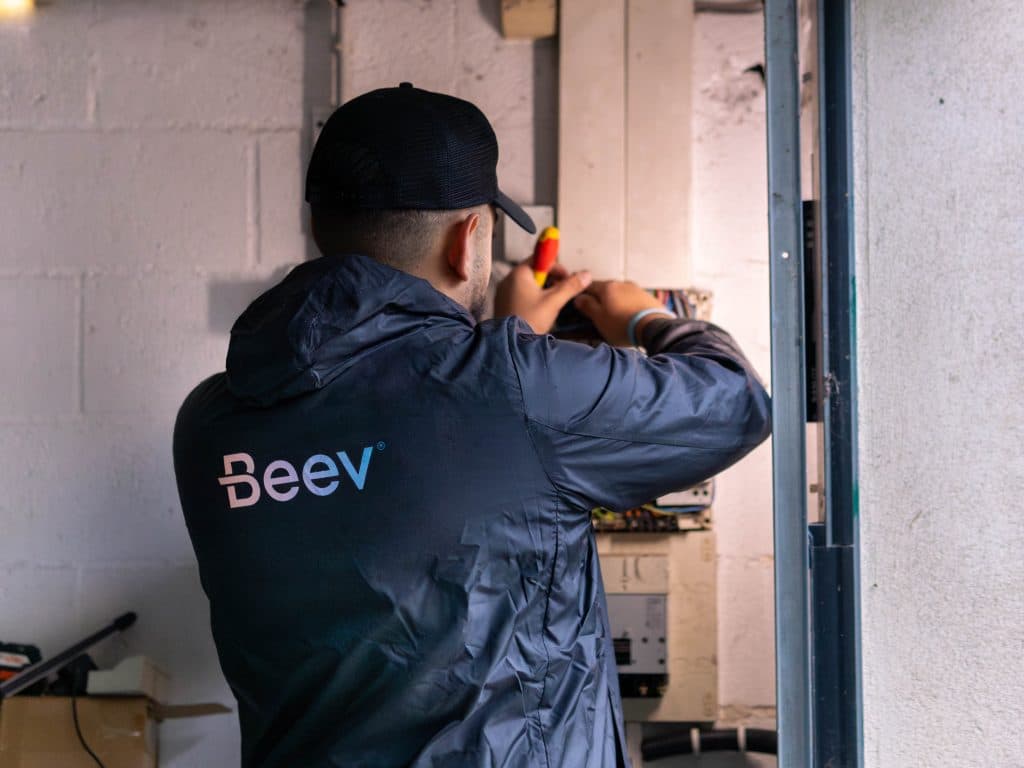

Installation must be carried out by an IRVE-certified professional electrician, and not self-installation, for safety and warranty reasons. In some countries, such as France, self-installation is illegal.
The process usually includes the electrical connection of the Wallbox, possibly with an upgrade of the existing electrical circuit, as well as the laying of an RJ45 network cable for connectivity.
A power management unit (Power Boost) can be added to optimize charging according to the home's consumption.
Wallbox installation costs
Costs vary according to brand, Wallbox model (3-22kW), electrical connection distance and any circuit upgrades required.
For a basic Wallbox, allow around €500-1500 for purchase and professional installation. Top-of-the-range models can cost over €2,000 to install. The Power Boost represents an additional cost of around €300-500, depending on the model.
Professional installation costs are generally included in the sales price, but it's advisable to check carefully and ask for a detailed estimate.
So for a complete turnkey installation of a quality domestic Wallbox with intelligent management, you'll need to budget between €800 and €2500, depending on the options you choose.
Read more: Wallbox Pulsar Socket vs Easee: which terminal to choose?
Financial assistance for home installation of a charging station 2024
The government has set up a number of financial assistance to encourage the transition to electric mobility. These include :
- a tax credit of €500 per controllable charging station for private homes
- VAT reduced to 5.5%.
The tax credit
The newly-introduced tax credit, which replaces the CITE (tax credit for energy transition), now offers a tax deduction of €500 for each controllable charging station installed at home.
In order to benefit from this provision, a number of criteria must be met, including the installation of a controllable charging system, defined as a device with the ability to modulate the power demand or program the recharging of the electric vehicle. In addition, it is imperative to call on a professional qualified in electric vehicle charging infrastructures.
The amount of the tax credit is calculated at 75% of the expenditure incurred for the acquisition and installation of the equipment, with a ceiling of €500 per recharging point for the 2024 financial year. This amount was previously set at €300 per charging station until the end of 2023, with no requirement for a controllable charging station.
In practice, for a couple subject to joint taxation, the installation of two home charging stations can give entitlement to a tax credit of 2 x €500. If the amount of tax due is less than the amount of the credit, the tax authorities will refund the difference.
We strongly recommend that you keep a detailed invoice of the work carried out, including details of the location where the work was carried out, the technical description of the charging station and the total amount of the expenses incurred. Although presentation of the invoice is not required for tax purposes, it is essential that you keep it in case the tax authorities carry out an audit.
NB: Unfortunately, opting for a reinforced Green'Up (Legrand) type plug will not entitle you to a tax credit, unlike the installation of a bollard.
Reduced-rate VAT
Since the start of 2021, an advantageous tax measure has been in place for private individuals: reduced-rate VAT is now applicable to the installation, fitting and maintenance of charging systems, provided they are carried out by a qualified professional, in particular an electrician specialized in Electric Vehicle Charging Infrastructure (IRVE). This requirement is now a legal obligation for charging stations with a power rating of 3.7 kW or more.
This measure applies to various categories, including owner-occupiers, lessors, condominium associations, as well as tenants and free occupants. Professionals and legal entities are not eligible.
As of January 1, 2023, a major administrative simplification will be introduced: it will no longer be necessary to provide the installer with proof of the age of the home. In fact, the date of construction of the home is no longer a decisive criterion for benefiting from the reduced rate, which greatly simplifies procedures for potential beneficiaries.
Financial aid for the installation of a recharging point for professionals 2024
Advenir bonus for companies
Under the Advenir program, the amount of aid granted depends on the composition of the vehicle fleet, which may include light or heavy vehicles, and the connection capacity of the project infrastructure, which may be less than or greater than 500 kVA.
For the installation of recharging points in private parking lots open to the public, the Advenir bonus can cover up to 30% of the cost (excluding tax) of supplies, equipment and work, with a limit of €1,000 to €2,700 (excluding tax) per recharging point.
For the installation of recharging points in parking lots dedicated to company fleets and employees, the Advenir bonus can cover up to 20% of the cost (excluding tax) of supplies, equipment and work, with a limit of €600 per recharging point.
Find out more : What changes will there be in 2024 to support the installation of terminals in businesses?
Charging your electric car: tips to follow
Limit recharging of your electric car to 80%.
It is generally recommended not to charge your electric car to 100%, and to limit charging to 80%, for several reasons. Firstly, to preserve battery life. Each charge and discharge cycle wears down the battery, and the more the battery is charged to 100%, the greater the number of full charge cycles, which can reduce its lifespan. Limiting the charge to 80% reduces the number of full charge cycles, thus extending the battery's life.
Secondly, it reduces charging time. The charging speed of a battery is highest when it is lightly charged, and decreases as the battery fills up. This means that the last 20 percent of the charge can take as long as the first 80 percent. Limiting the charge to 80% therefore reduces the total charge time.
Last but not least, this can help reduce recharging costs, especially at fast-charging stations. Some charging stations charge according to charging time, not the amount of electricity consumed. Limiting charging to 80% reduces charging time and therefore the cost of charging.
However, these recommendations may vary according to battery type, make and model of electric car, and conditions of use. It is therefore important to refer to the manufacturer's instructions, and to consult a professional in case of doubt.
Check the charging time of your electric car
The charging time of an electric car depends on a number of factors, including battery capacity, initial charge level, maximum charging power of the car and charger used, and weather conditions.
A full charge from a standard household socket (230V, 16A) generally takes between 8 and 12 hours for an electric car with a 40 kWh battery, and between 12 and 18 hours for a 60 kWh battery. However, charging speed can be much faster on a public charging station or home wallbox.
At a fast charging station (DC) with a maximum charging power of 50 kW, a 40 kWh battery can be recharged to 80% in around 30 to 40 minutes, and a 60 kWh battery in around 45 to 60 minutes. At an accelerated charging station (AC) with a maximum charging power of 22 kW, a 40 kWh battery can be recharged to 80% in around 2-3 hours, and a 60 kWh battery in around 3-4 hours.
Use a suitable recharging point
Make sure you use a charging station compatible with your electric car. Charging stations may have different connectors and charging powers.
Plan your routes
Before you set off, check the range of your electric car and plan your recharging stops if necessary. A number of apps and websites can help you find the charging stations available on your route
Conclusion
The future of electric vehicle charging looks bright, with constantly improving infrastructure, increasingly efficient charging technologies and a collective awareness of the importance of environmental sustainability. Electric charging is no longer a constraint, but an integrated component of the modern driving experience, testifying to the commitment to a greener future.
If you're thinking of installing a charging station for business or at home, our Beev experts are at your disposal to advise and support you in your project. We look forward to hearing from you.
